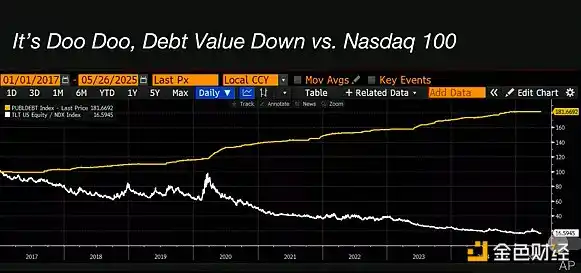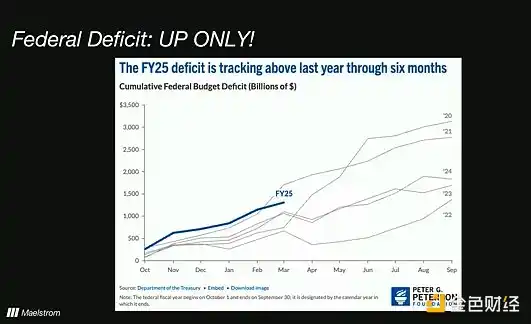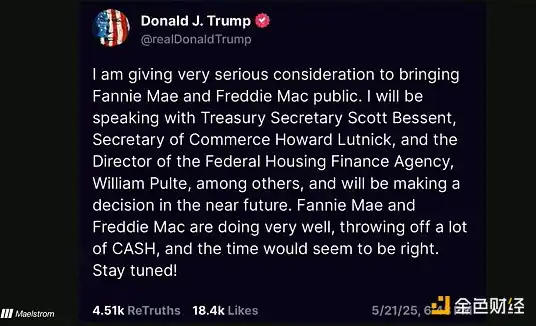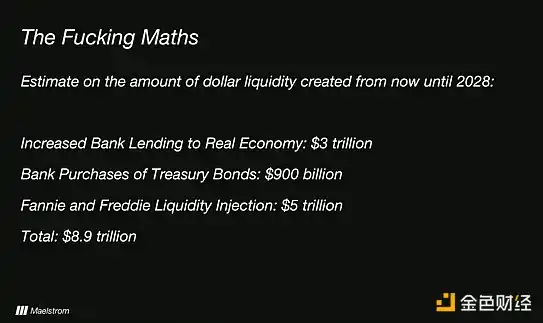Original source: Arthur Hayes' keynote speech "It's F**king Maths" at Bitcoin 2025
Original compilation: Golden Finance
The Task of the U.S. Treasury Secretary
The new U.S. Treasury Secretary is Bessent, who previously worked with George Soros and helped break several different sovereign currency peg mechanisms. He clearly understands what needs to happen economically for the U.S. to succeed in the face of all these issues.

This is a photo of Bessent giving a sales presentation. I believe some of you have seen the movie "Glengarry Glenn Ross" and that iconic scene where… I forgot the actor's name, but he stands there telling the salespeople ABC—Always Be Closing. So what is Scott Bessent's job? Every time you see him on TV, imagine him as a used car salesman trying to sell you something. What is he selling you? Bonds. His job is to sell bonds because his boss—the U.S. government—needs to finance itself.

So why are bonds a bad investment? The yellow part is a chart of the total U.S. national debt starting from 2017. You can see that it has risen about 80% from a baseline of 100. Then I compared this index with TLT (an ETF tracking long-term U.S. Treasuries) divided by the Nasdaq 100 index. So if the chart goes down, it means the Nasdaq is outperforming bonds. From 2017 to now, the Nasdaq has outperformed bonds by about 80%. So yes, you might have made money from the coupon of holding bonds, but if you had put that money into the stock market, you would have made 80% more.
Let's look at the same chart compared to gold. The situation is similar. If you had bought gold instead of holding U.S. Treasuries, you would have performed about 80% better. Clearly, this is not a gold or stock conference. We are talking about Bitcoin here. So how does it perform compared to Bitcoin? That is even more striking. By buying Bitcoin instead of bonds, you would also outperform bonds.
Therefore, while many investment professionals may come out and tell you, "You know, I think the bond market will perform well in the next year or two," that may be true. You might actually make money holding bonds, but you would make more money holding something else. The goal of investing is to maximize your earnings in the current environment, and holding government bonds is not a good deal.
Now, this clearly brings us back to my point that Bessent's job is very difficult because as more and more investors read these charts and understand that if they continue to hold government bonds, their performance will be far inferior to what they could have earned for themselves and their clients, more government action will be needed to ensure that the U.S. government can finance itself. So it is clear that after the Trump administration came to power, they talked about the U.S. government's spending problem.
U.S. Debt Deficit and Inflation

This is a chart from the Peterson Institute, showing that the U.S. fiscal year starts in October. We can see that as of March this year, despite a lot of effort and rhetoric to control excessive government spending, our spending in fiscal year 2025 is already higher than in fiscal year 2024, which was already a record deficit year.
It is clear in the media that we have been discussing how certain individuals—we will mention that person later—will control government spending by eliminating fraud and abuse. We talked about it for a while, and then the protagonist of this effort, the Doge "pioneer" Musk, disappeared. We haven't heard from him in a while because it is bad political maneuvering. Every dollar the government spends goes into someone else's pocket. If you stand up and say we need to cut trillions of dollars from the deficit, that will obviously have adverse effects on many people and businesses. We have seen the negative reactions from the media and individuals. Ultimately, I think politicians realized, "Hey, this is not a good political strategy. Let's recall our 'attack dog' and let him fade from the public eye to run his private company."
But this means that if they cannot meaningfully cut the deficit, how do you balance the accounts? Recently, Scott Bessent has started making the media rounds, talking about how he is focused on growth. He is fully committed to pursuing growth. So if you are facing a massive deficit, what does that mean? It means you need to have the nominal GDP growth rate exceed your interest costs, which is very difficult unless you plan to increase the amount of credit in the economy.
Many of you here are Americans or have spent a long time in North America. I have lived most of my adult life in Greater China. When you live in China, you understand that GDP or growth is merely a function of how much credit you are willing to inject into the economy. If we want to understand what the Trump administration—or any administration in the face of these mathematical facts—will do, we must understand that this economy relies on credit. So if you are willing to inject more credit into the system, you can achieve any growth target you want. So if Bessent says they want 6% or 7% nominal GDP growth, great, how much credit are you planning to create? We want to know how much credit they plan to create because that ultimately leads to Bitcoin outperforming all other assets when priced in fiat currency.
So how do we surpass a 7% persistent deficit? What can they do? Typically, authorities will blow up another financial bubble. Perhaps that is Bitcoin and cryptocurrency. Politicians take a very loose stance and say, "Hey, we want our crypto brothers and sisters to get very rich, pay capital gains taxes, you know, consume a lot, and improve economic performance." They can encourage the banking system to lend to the real economy, which I referred to in an article I wrote a few months ago as "quantitative easing for poor people." Basically, if the banking system is not doing financial engineering but using its balance sheet to lend to ordinary companies, that will create jobs and economic growth.
Now, the problem with both of these things is inflation. Inflation is necessary for balancing the balance sheet. I know this is an unpopular word in politics and economics, but inflation is necessary for the government to bear its massive debt. So we will face inflation, and clearly, everyone here understands that Bitcoin is the best hedge against this. But we need to spread this message worldwide.
The Road to $1 Million Bitcoin
Finally, I want to talk about a few things. The road to a $1 million Bitcoin, I believe, primarily has three aspects.
First is capital controls and tariffs. I recently wrote an article delving into why I think tariffs are a bad political tool because they encourage goods inflation and empty shelves, which ordinary Americans do not like. But you can achieve the same economic rebalancing goals using capital controls. So we are starting to see some fringe economists—who will soon become mainstream—talk about how they can eliminate certain tax benefits enjoyed by foreigners investing in the U.S. and redistribute that income to voters or use it to purchase specific maturities of government bonds.
The second thing is the exemption of the Supplementary Leverage Ratio (SLR), which I will elaborate on later. Scott Bessent has mentioned this in several interviews, and he recently even strengthened his rhetoric in interviews with Bloomberg and Fox News, discussing how he believes this ratio will be exempted this summer, just like large banks could leverage unlimited purchases of government bonds during the COVID pandemic.
Finally, an increasingly concerning area is Fannie Mae and Freddie Mac, the two government-sponsored enterprises (GSEs), which, if allowed again, will be able to inject a large amount of capital into the mortgage market.
Let's look at this "triple play." "Foreigners must pay" is a good political strategy. If you are going to tell voters, "I am going to give you something," if someone else is paying for it, that is obviously the best scenario. This is how politics works around the world. Back in 1984, because the U.S. government faced another problem, the same problem: how do we get people to buy our debt? At that time, the yield on 30-year government bonds was about 12%. They said, "Hey, why don't we exempt foreign bondholders from withholding tax?" Now, if you are an American, all the interest you earn from holding government bonds is taxed at a specific rate, which I think is around 20% to 30%. And now, if you are a foreigner, you do not have to pay that tax.
So now there is discussion about eliminating this exemption to achieve several purposes. First, by essentially taxing the income that foreigners receive, this could raise over a trillion dollars in a decade. Now, obviously, if you are taxed, you might not want to hold government bonds. So one idea is, can we set a very low tax rate for holding long-term government bonds—these are the things Bessent finds hard to sell—while imposing a high tax on government bonds (short-term bonds)—these are the cash-like instruments you might hold in a money market account. Everyone wants this; everyone wants a high-yield cash account. So let’s penalize you for holding short-term government bonds but incentivize you to hold long-term government bonds. This is a mild form of yield curve control. How do we get demand for long-term bonds from foreigners? Just change the tax rate.
Now, the ultimate question is who will replace foreigners as the marginal holder of the debt. Clearly, this means they will print money to make up for the funds lost due to foreigners not investing in this debt.
Another thing: the bank bond-buying frenzy. The Supplementary Leverage Ratio (SLR), if you remember nothing else from this speech, please remember this. It is a way for banks to purchase bonds with unlimited leverage. There is something called Basel III, which is a very complex regulation established after the global financial crisis that did one smart thing. It said, "Hey, banks, you don't have enough capital; why don't we let you have more capital?" So if I hold a bond, I have to put in some of my own equity capital. This makes sense. It means that U.S. banks will face limitations on the amount of U.S. Treasuries they can purchase. Remember, Bessent needs to sell $20 trillion or more in bonds each year, and he needs to ensure that someone can buy these bonds. So if I remove this exemption, it allows commercial banks to purchase government bonds with unlimited leverage. When they can do this, their profits will soar because the interest rates they pay on commercial deposits are very low. Clearly, the smiling Jaime Dimon is very much hoping for this to happen. He has stated on multiple occasions that he believes the banking system needs this exemption. As I often say, Jaime Dimon gets what he wants.
Another thing, stablecoins are obviously a very hot topic lately. If you combine stablecoins or the non-interest-bearing dollar stablecoins issued by U.S. banks with the SLR exemption, they essentially become like Tether. They are not allowed to pay any fees to those investing in these stablecoins and using them for transfers, and then they can put all this money into U.S. Treasuries without capital requirements. This is essentially unlimited profit. So I expect that if this exemption passes—and I believe it will—you will see large U.S. banks very consistently trying to issue "orange stablecoins" (referring to stablecoins related to Bitcoin or a bank supporting Bitcoin) because this is a way for them to earn a lot of net interest income.
This is a post by Trump on "Truth Social" regarding Fannie Mae and Freddie Mac.

Basically, these are organizations that issued mortgages before the 2008 financial crisis. They were very profitable. Now, what happens when you release Fannie Mae and Freddie Mac? Essentially, you liberate them from government conservatorship. This deal has been discussed for nearly two years. If you bought in at one dollar, these companies might now be trading at eleven dollars in the market. But when you liberate them from conservatorship, they are allowed to issue more debt using their equity capital, with implicit government guarantees, and leverage it 33 times. Then they can purchase up to $5 trillion in mortgages. If you allow these two organizations to return to normal operations, that would inject $5 trillion of liquidity into the market.
Simple Calculations
Where do I get the idea that Bitcoin could reach $1 million?

If we consider "quantitative easing for the poor"—banks providing more loans to the real economy—I estimate that up to $3 trillion in bank credit could be generated from now until 2028. The statistic to watch is the "other deposits and liabilities" item on the Federal Reserve's balance sheet, where we will see this happening.
If banks are allowed to purchase government bonds, it is estimated that $900 billion in foreign demand could disappear. This must be compensated by commercial banks, which can now purchase these government bonds with unlimited leverage.
Finally, let’s release Fannie Mae and Freddie Mac, bringing $5 trillion of liquidity to the market.
This would bring us to nearly $9 trillion in money printing from now until 2028.
Let’s put this in context. During the COVID pandemic, the U.S. stimulus plans and all the aid given to the financial sector totaled about $4 trillion. From the low in March 2020 to $70,000 in November 2021, Bitcoin rose about tenfold.
Remember, prices are determined by the marginal. It is the marginal price that matters, not the total stock. Therefore, if we see a reduction in Bitcoin on trading platforms due to ETF demand, and if the money we print from now until 2028 is double that of the pandemic period, then reaching $1 million for Bitcoin becomes very easy.
免责声明:本文章仅代表作者个人观点,不代表本平台的立场和观点。本文章仅供信息分享,不构成对任何人的任何投资建议。用户与作者之间的任何争议,与本平台无关。如网页中刊载的文章或图片涉及侵权,请提供相关的权利证明和身份证明发送邮件到support@aicoin.com,本平台相关工作人员将会进行核查。




